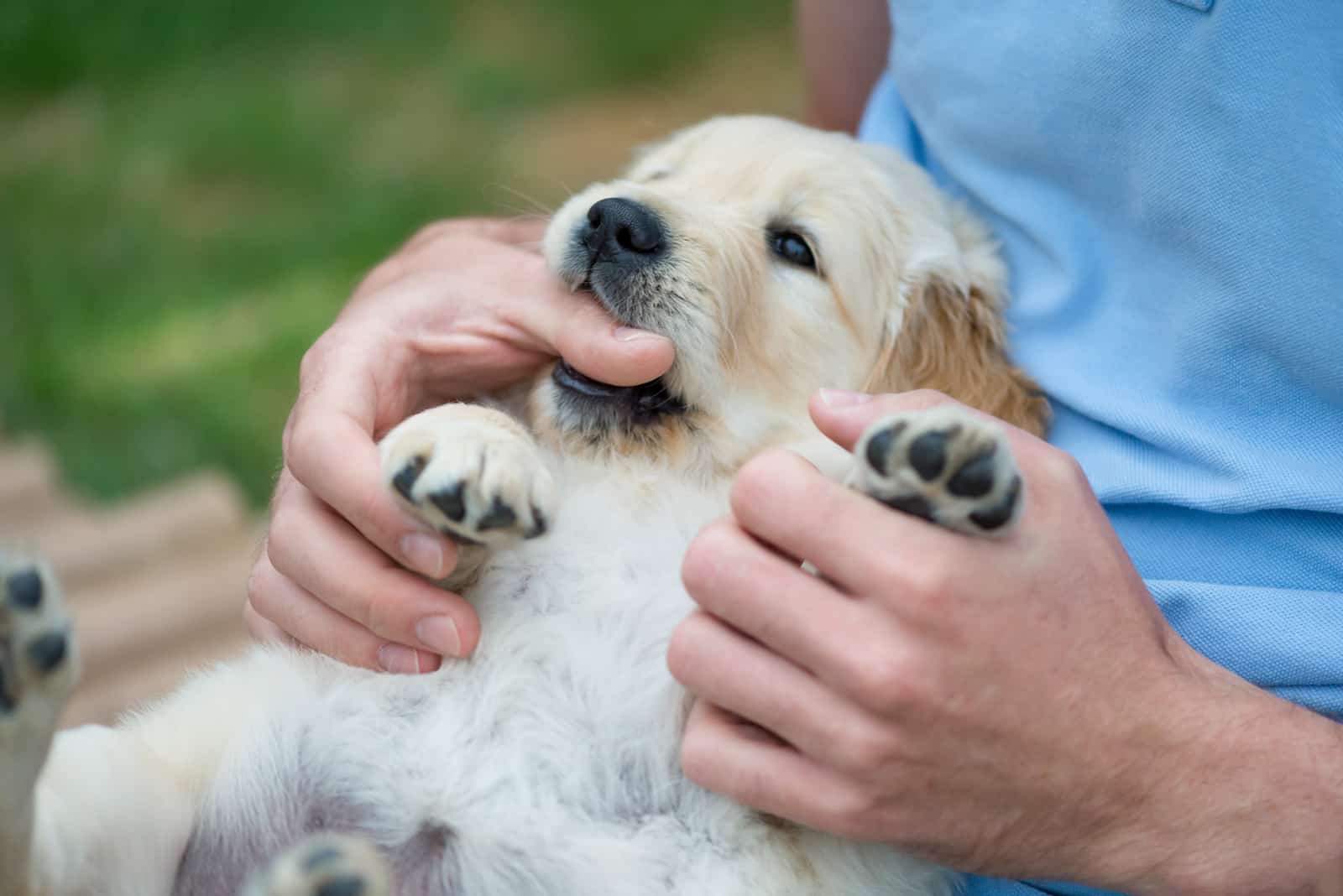There’s no quick or simple answer to this! Dog behavior can be a puzzle, even to seasoned pet parents. To help you out, we’ve done some homework to find the common reasons why your furry friend keeps nibbling on you.
Nibbling isn’t a word you often associate with dogs. They bite, chew, nip, or gnaw, but dog owners don’t often talk about their pooches nibbling.
We must be clear about what we mean, as there’s potentially a world of difference between a dog biting someone or nibbling on them. A severe dog bite can cause serious damage and might need medical treatment. We also need to question how and why this event happened in the first place.
Nibbling isn’t usually a problem, but if it’s become a nuisance or is causing you to worry, then it’s best to seek an explanation and a solution.
And that’s what we’re here for!
As well as answering the question, Why does my dog nibble on me? we’ll address some more serious issues on the subject of biting.
Why Does My Dog Nibble On Me like Corn On The Cob?
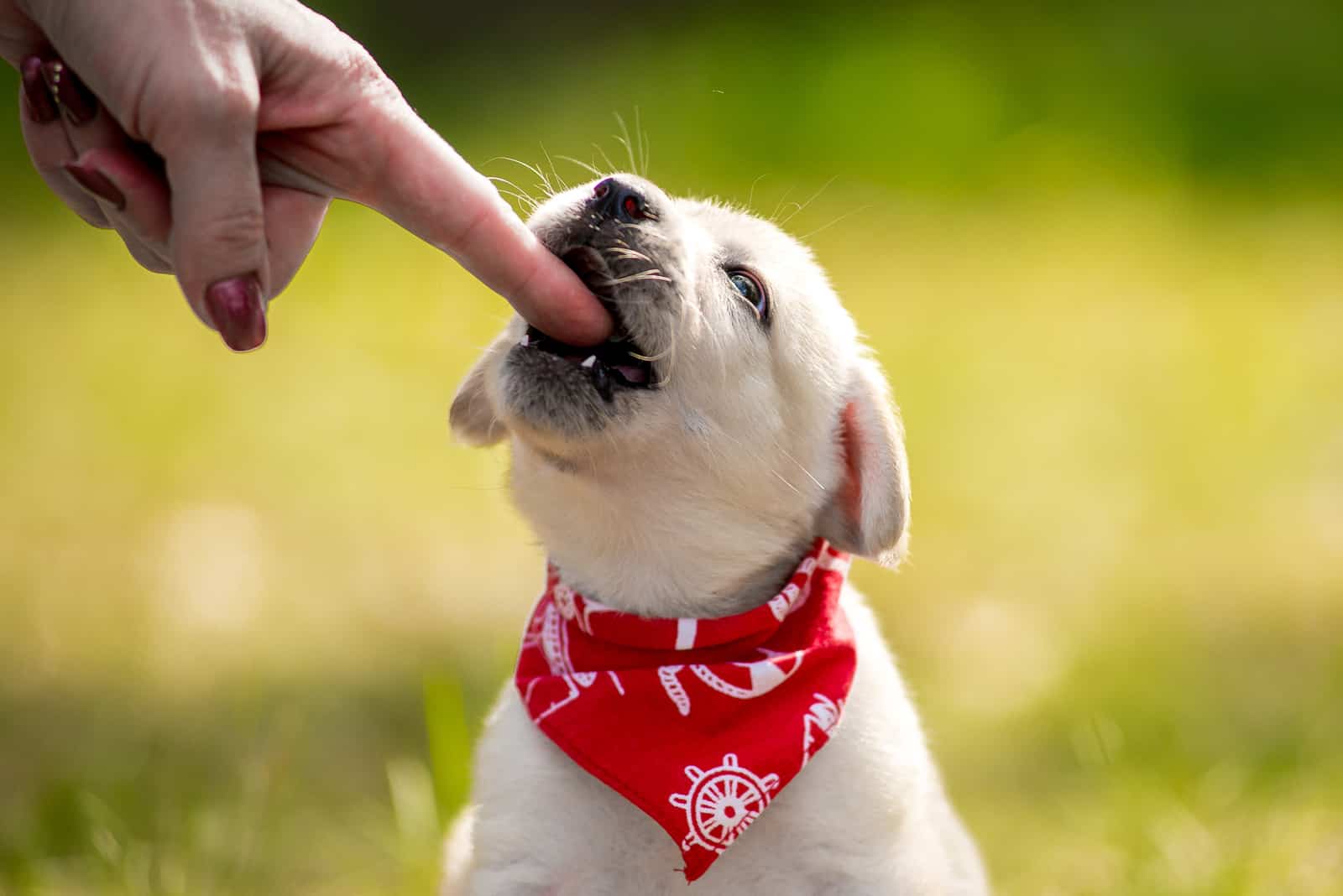
Probably to show affection.
The image of a dog nibbling on someone just as if they were eating a corn cob is both accurate and amusing! Dogs don’t seem built for nibbling, and it looks so cute when they use their front teeth to nibble on things.
Many dog owners will have seen their pups using their front teeth to scratch at an irritated paw or a patch of skin on their leg. They might have witnessed them tugging tenaciously at a piece of rope or tearing off strips of fabric from a tennis ball with their front teeth.
When they do this, their noses wrinkle, revealing the teeth between their canines. These are the teeth they use when nibbling you, and they’ll do this gently if it’s a sign of affection.
Dogs love to groom each other. It’s a way of bonding and showing respect to those higher in the pecking order. So, when your dog nibbles on you, it’s most likely trying to groom you as a way of showing its love as well as respect for your position as pack leader.
Why does my dog nibble on me? It’s grooming you because it loves you!
Why Does My Dog Nibble On Me And My Clothes?
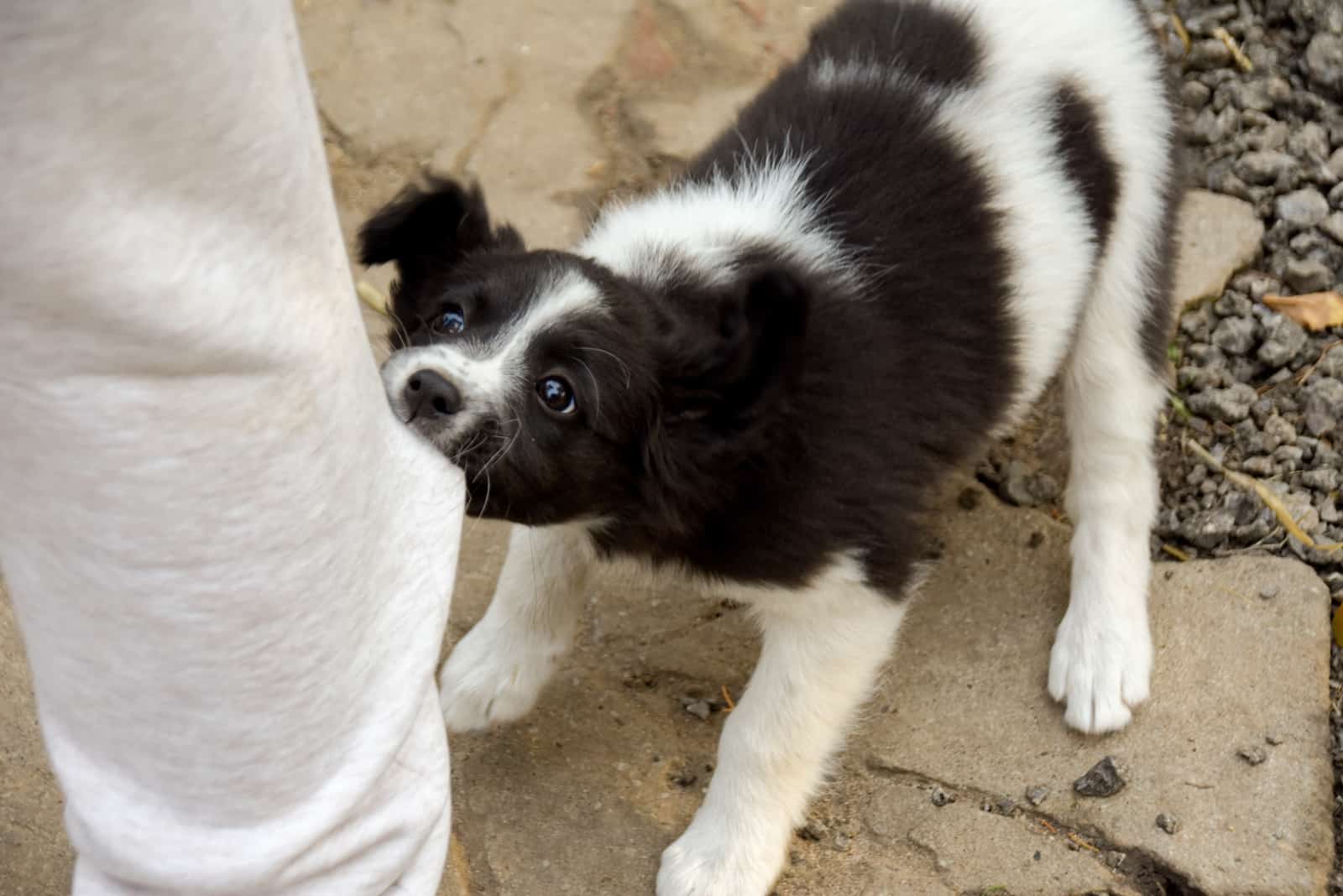
It could be that it likes the different textures, smells, and flavors!
Dogs have an amazing sense of smell, but their taste buds aren’t anywhere near as good as ours. Whether you’re fresh from the shower, just home from work, or you’ve emerged sweating from a heavy workout at the gym, your skin is alive with all kinds of fascinating and tempting smells for your dog.
And your clothes carry their own scent, picking up particles from outside as well as soaking up perfume, cologne, deodorant, lotion, detergent, and conditioners.
These are magnified thousands of times in your dog’s nostrils, each one telling its own story and building a vivid picture in your dog’s mind.
You might find it gross, but your dog might also be attracted to your salty skin if you’re all sweaty. Licking and nibbling your skin is a way to get at that saltiness. And even if you’re all clean, your shower gel, deodorant, or any other product you apply, may attract your dog.
As for nibbling on your clothes, your pooch might like the texture. It’s a bit like a comfort blanket.
Why does my dog nibble on me? Because you smell good (or bad!) and your clothing has interesting textures that make your dog feel safe and secure.
Why Does My Dog Nibble On Me Like I Have Fleas?
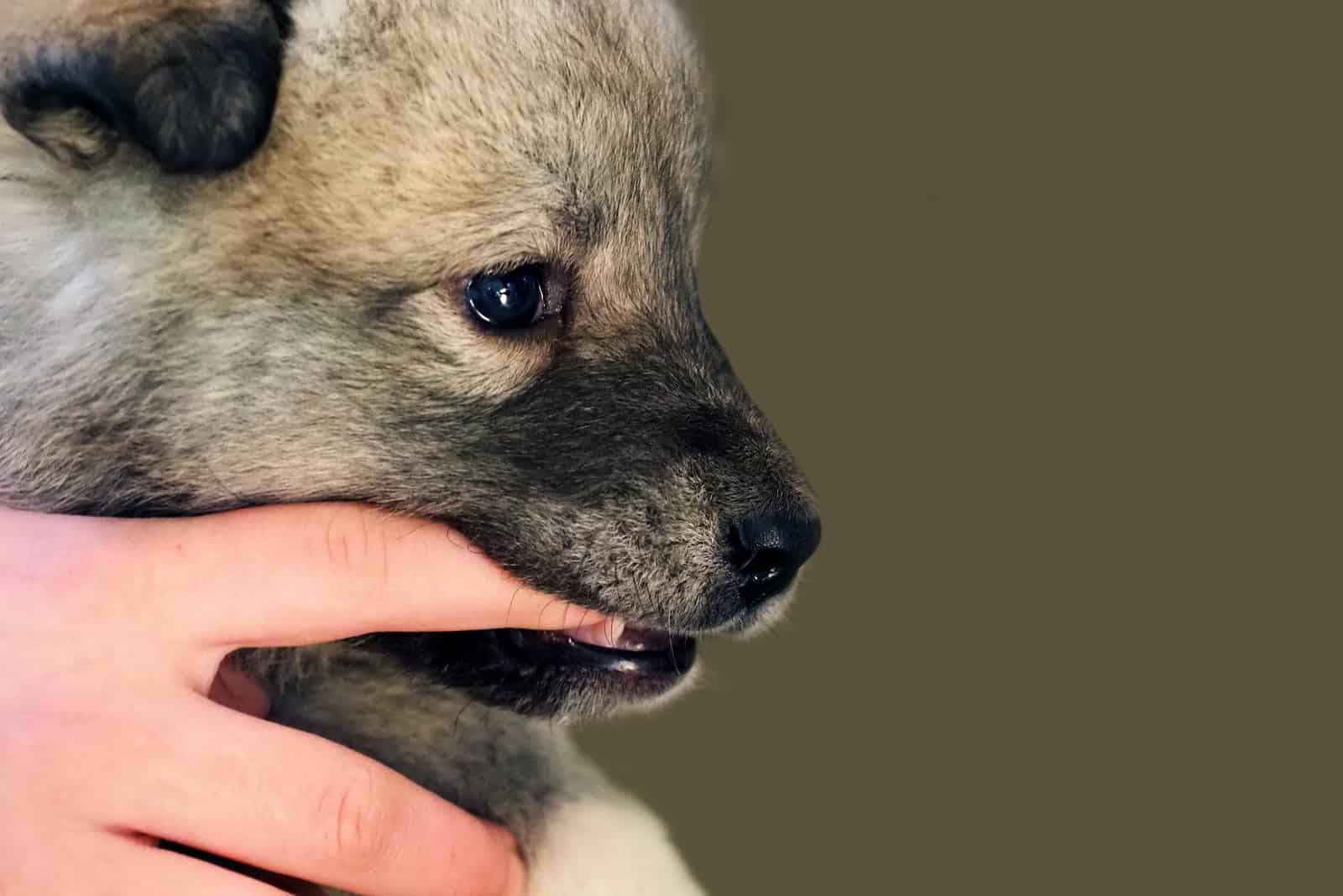
It’s unlikely that your dog thinks you have fleas! As we’ve seen, it might be a sign of affection.
However, there could be several other causes for nibbling behavior.
As we know, puppies like to explore. It’s part of their development, and we wouldn’t expect anything different. They use their mouths as a way of finding out how things taste or feel, and teething causes them a lot of discomfort, which is why they use their puppy teeth to chomp and chew on everything, including you!
So, chewing and nibbling are natural for pups.
But what about older dogs? Why do they nibble on you?
For one, it often gets a reaction. How do you respond when this happens? You either smile, tell your dog they are a good boy/girl, and give them extra snuggles, or you react playfully, turning it into playtime. You might even react with a yell if the nibbling is too rough and nips your skin.
Either way, you give them attention, which could be exactly what they wanted!
Another common reason for nibbling is boredom. Most dogs like to be mentally active, and some breeds are highly intelligent. These super-smart dogs (such as Border Collies, Aussie Shepherds, German Shepherds, Belgian Malinois, etc.) must have adequate mental stimulation, or they will become frustrated and bored. This can lead to behavioral changes, including chewing up stuff in the home, excessive barking and howling, forgetting their potty training, and nibbling on you.
In a way, the two reasons given here are linked: your puppy is bored, so it grabs your attention by nibbling and nipping you.
Whatever breed you have, you must always make sure that they get enough exercise and mental stimulation. Set aside time to take them for walks and runs, visit the dog park, enroll in agility and training classes. Sign them up for obstacle courses, herding, or tracking competitions. Take them for hikes up in the hills, and invest in interactive puzzle toys.
Above all, spend quality time with them and give them a sense of purpose. To do anything less than this is cruel and unfair. If you don’t have time to do this, then you don’t deserve a dog – it’s as simple as that.
Why does my dog nibble on me? It might be bored, and it wants you to make life more interesting and exciting!
Why Does My Dog Nibble On Me When Excited?
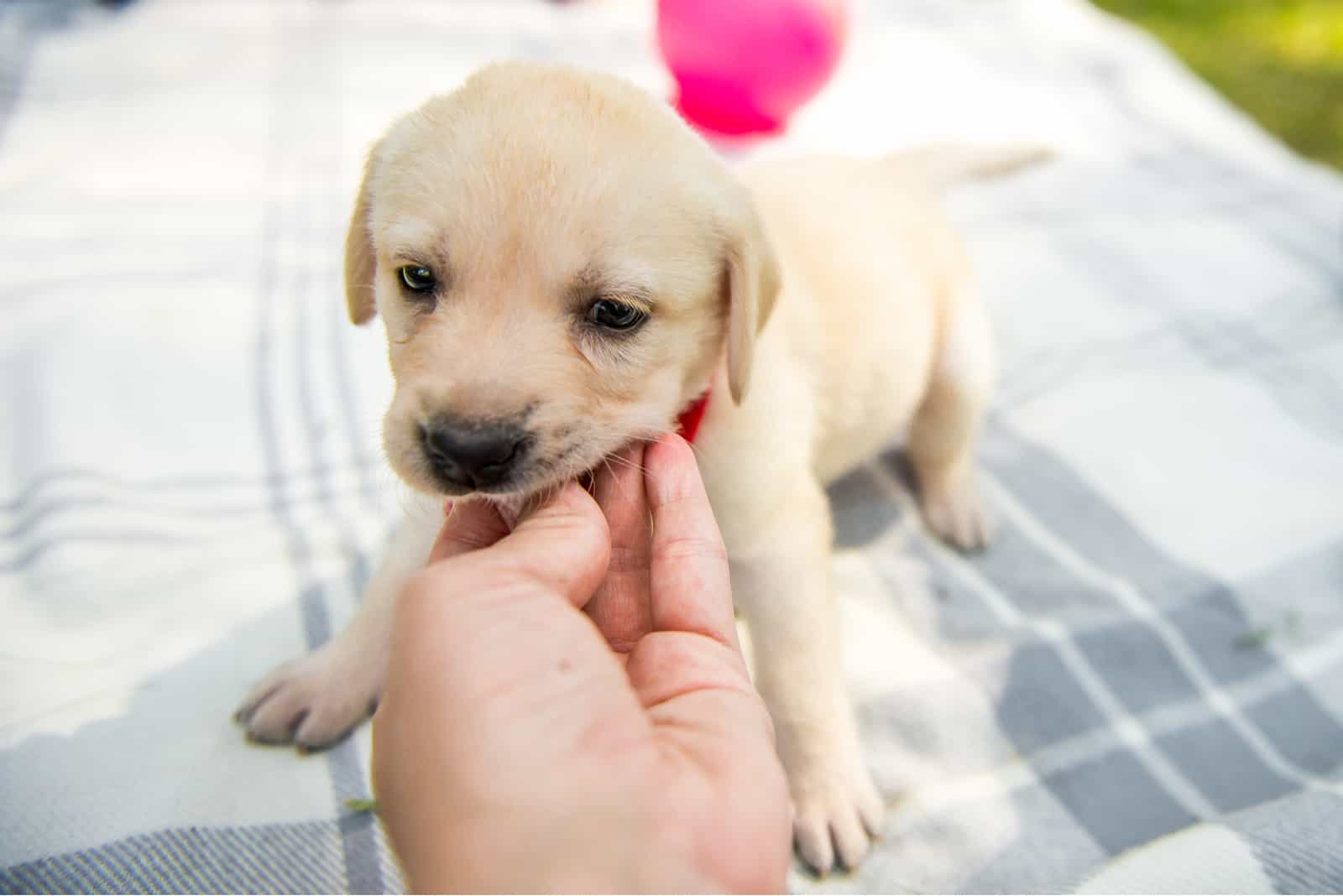
Our doggy friends do all kinds of things when they get excited! All it takes is for them to hear the word walk or to see you fetching their leash, and they’re off. It might happen when you arrive home, when you have visitors or when they see their friends at the dog park.
Most dogs love to play, even when you don’t feel like it. They can go from snoozing one moment to a hundred miles an hour in the blink of an eye, usually when they think it’s time for a walk, treat, food, or playtime.
This is connected with the previous section in that dogs love to be kept mentally stimulated and physically active. One of the main reasons dogs sleep so much during the day is because they don’t have anything to do.
However, they need to use up their energy somehow. And when they get excited, they can’t keep it to themselves! If you don’t show any signs of joining in the fun, your dog might just nudge you into action by nibbling or nipping.
This is all very cute, but you do need to maintain control as you don’t want this to get out of hand. There’s nothing wrong with a bit of excitement, and we can understand why our furry friends are so happy. Even so, when they get overexcited, it can lead to overly enthusiastic nipping, which can be painful.
Dog obedience training is the best way to calm your dog down. You don’t want to spoil its fun, but it’s a good idea to assert your control over the situation. All that excitement and energy can then be directed into whatever activity you have planned for your dog during the day.
Teaching your dog clear, strong command words is a good way of taking control. Clicker training is an excellent method as it gets your dog’s attention immediately. You can also use chew toys to redirect your dog’s focus.
It’s important that you use positive reinforcement to train your dog rather than yelling or smacking. When your pooch gets too excited and starts nibbling on you, use a command word and/or the clicker to force a time-out. This will allow the dog to calm down, giving you time to decide what to do next.
Why does my dog nibble on me? It’s overexcited and wants you to join in. You need to take control and find a balance, allowing your dog to use its energy at the appropriate time.
Why Does My Dog Try To Bite Me?
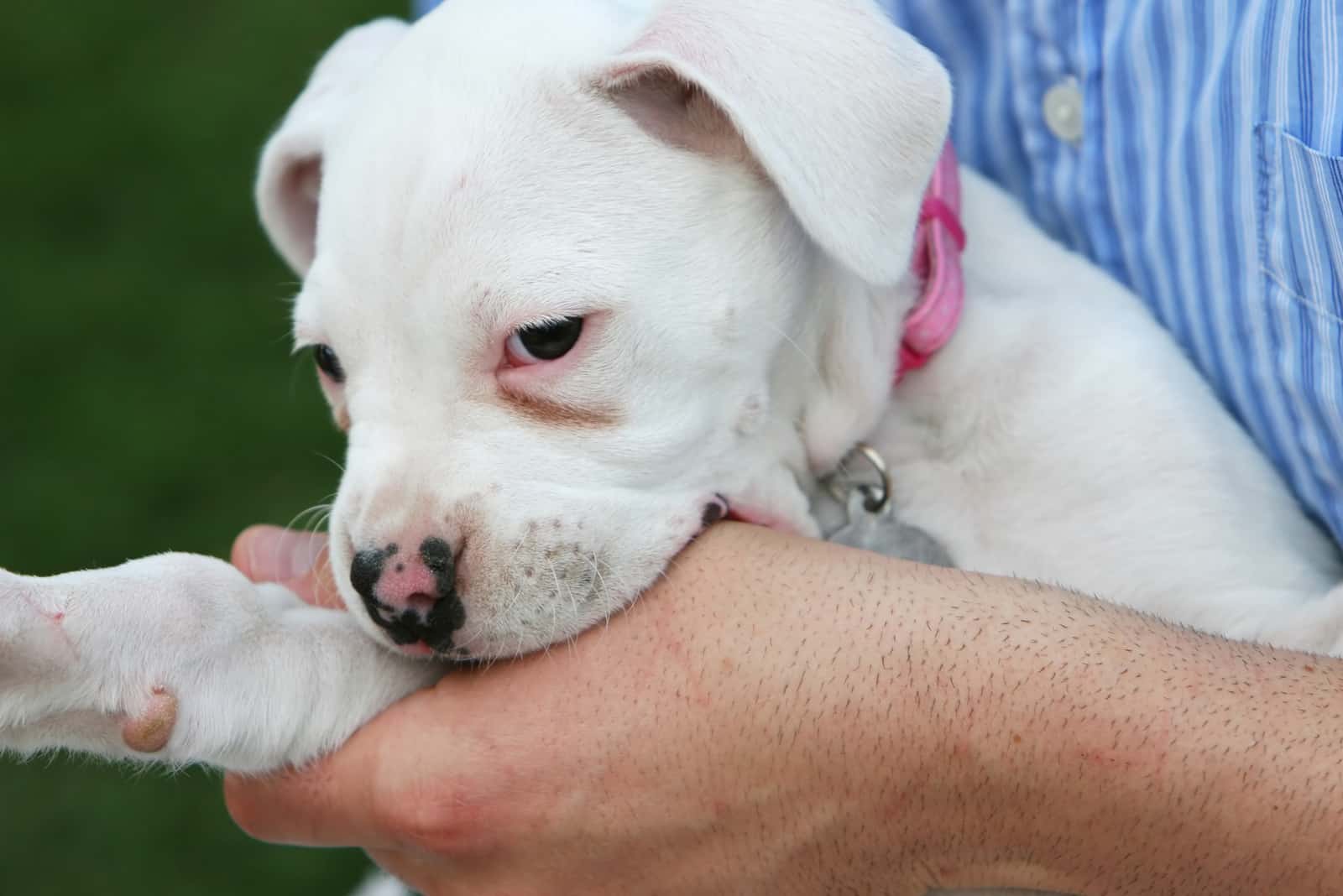
The first thing to establish is whether your dog is intentionally trying to harm you, whether it is playing or reacting to circumstances.
Dogs use their mouths to explore the world. Their paws aren’t as useful as human hands, so they test things out using their teeth instead. They also rely on their teeth for protection. If a growl or a bark doesn’t do the trick as a warning, then the dog will attack or defend itself using its teeth.
When your dog bites you, try to pay attention to what’s happening. Is the dog showing signs of being scared? Is it sick or in pain? Did this take place at home or outside? Are there any mitigating factors?
Some people seem surprised when their fur baby growls and tries to bite them when they take food away from them. This is especially the case when the dog has stolen food, usually from the trash can. It hangs on to that slice of pizza as if it’s a priceless treasure, changing your normally docile dog into a ravenous wolf!
As shocking and upsetting as this is, it usually passes as quickly as it comes. And it’s best to leave the dog alone rather than risk getting bitten. You could try distracting them with another tempting treat, but if it doesn’t feel safe, then wait until they have either eaten the offending item or dropped it of their own accord.
https://www.youtube.com/watch?v=IQ3NvgqD18U
Of course, this behavior must be discouraged. Rather than punishing your pooch, you need to reduce the risk of it happening. First, you should put the trash can in a secure location where the dog can’t reach it or avoid putting food waste in it. You should also make sure that you use those command words you’ve been teaching your dog. Make it absolutely clear that they must obey.
Dogs might also try to bite you if they have an injury or are feeling unwell. They can’t speak and let you know what’s wrong, so they use growls, barks, biting, and body language instead. If you touch a sore spot while petting them, they might snap at you. It’s nothing personal, and they’ll usually regret it instantly. If you suspect this is the case, get your furry friend to the vet!
Dogs that are afraid will sometimes try to bite. It’s often half-hearted, more of a warning than a real intention to harm you. Rescue dogs frequently display this behavior as many of these poor pooches have been through rough times, and they don’t know who to trust. Thankfully, there are thousands of brilliant foster carers out there who take the time to rehabilitate and socialize these beautiful dogs until they are ready for their forever homes.
Other than this, your dog might try to bite you if it is overexcited. This can usually be overcome through training, though for extreme cases, you might need to seek help from an animal behaviorist.
Finally, if your dog is clearly being aggressive and trying to bite you, then you need to consider a medical cause (other than an injury), especially if this behavior happens suddenly. It could be that your dog is suffering from a neurological condition that is affecting its behavior. Your vet will be able to diagnose this and draw up a care plan to ease its suffering, depending on what is wrong. In any event, they will advise you on the best course of action.
Why does my dog nibble on me? To be fair, this is more serious than a bit of nibbling! But, as so many people ask about this issue, we thought it right to slip in a section on biting. The main thing is to distinguish between nipping, nibbling, chewing, and biting. You then need to determine whether your dog is happy, sick, scared, in pain, or is just being aggressive.
Why Does My Puppy Bite Me So Much?
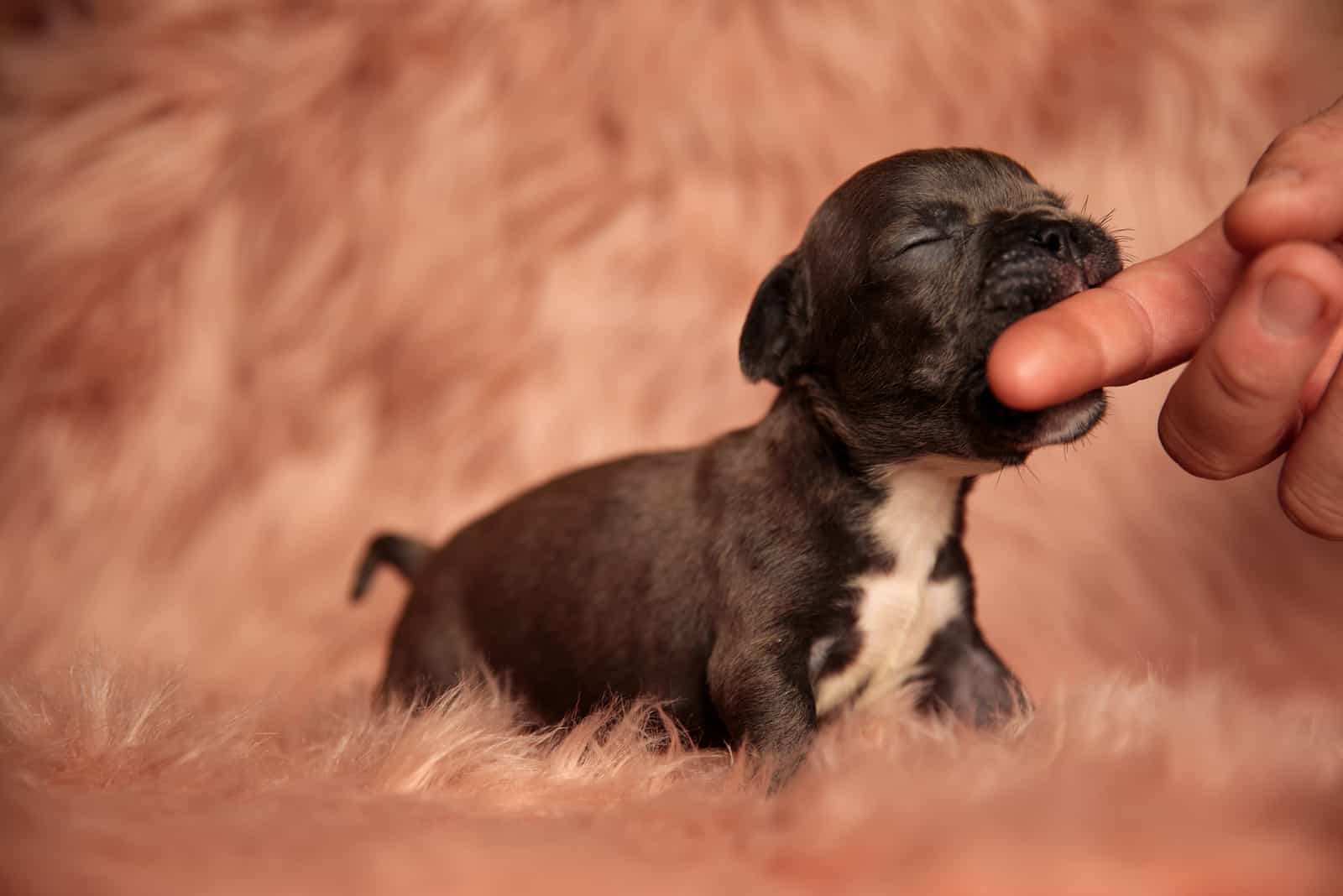
It’s what puppies do! That doesn’t mean that you just give in and let it happen.
Puppy bites can be painful as those teeth are like little pins. If you got your pup from a reputable breeder, then it would have been at least 8 weeks old. This means that you’ll have missed the first round of teething, which is a bonus!
However, around twelve weeks of age, their permanent teeth will start to grow. This can be a challenging time for all involved, as the pup will chew and bite whatever it sets its sights on, including you.
Again, we need to distinguish between real biting, play biting, and chewing. A pup that’s frolicking with its siblings will use its mouth to play bite. If it gets too rough, then the sibling will yelp and possibly retaliate. Sometimes the mother dog gets involved and will correct the pup with a soft nip or a growl. This is normal teething behavior, and most pups grow out of it, though some need more encouragement!
The three main words when it comes to young dogs are training, training, and more training.
Playing with a cute puppy is great fun, and it’s cuter still when they give you love bites. Dog mouthing affection plays a big part in their early development and continues into their adult lives. However, your furry pal needs to learn how hard is too hard, and they must know when to stop. It’s up to you to establish this through training.
Why does my dog nibble on me? Again, we’re dealing with biting rather than nibbling, but the two behaviors are closely linked. Pups will bite and nibble as they develop (partly because of the teething process), and those teeth are pretty sharp! You must assert control over your dog from an early age and train them well to rule out unwanted behavior.
Why Does My Puppy Bite Me And No One Else?
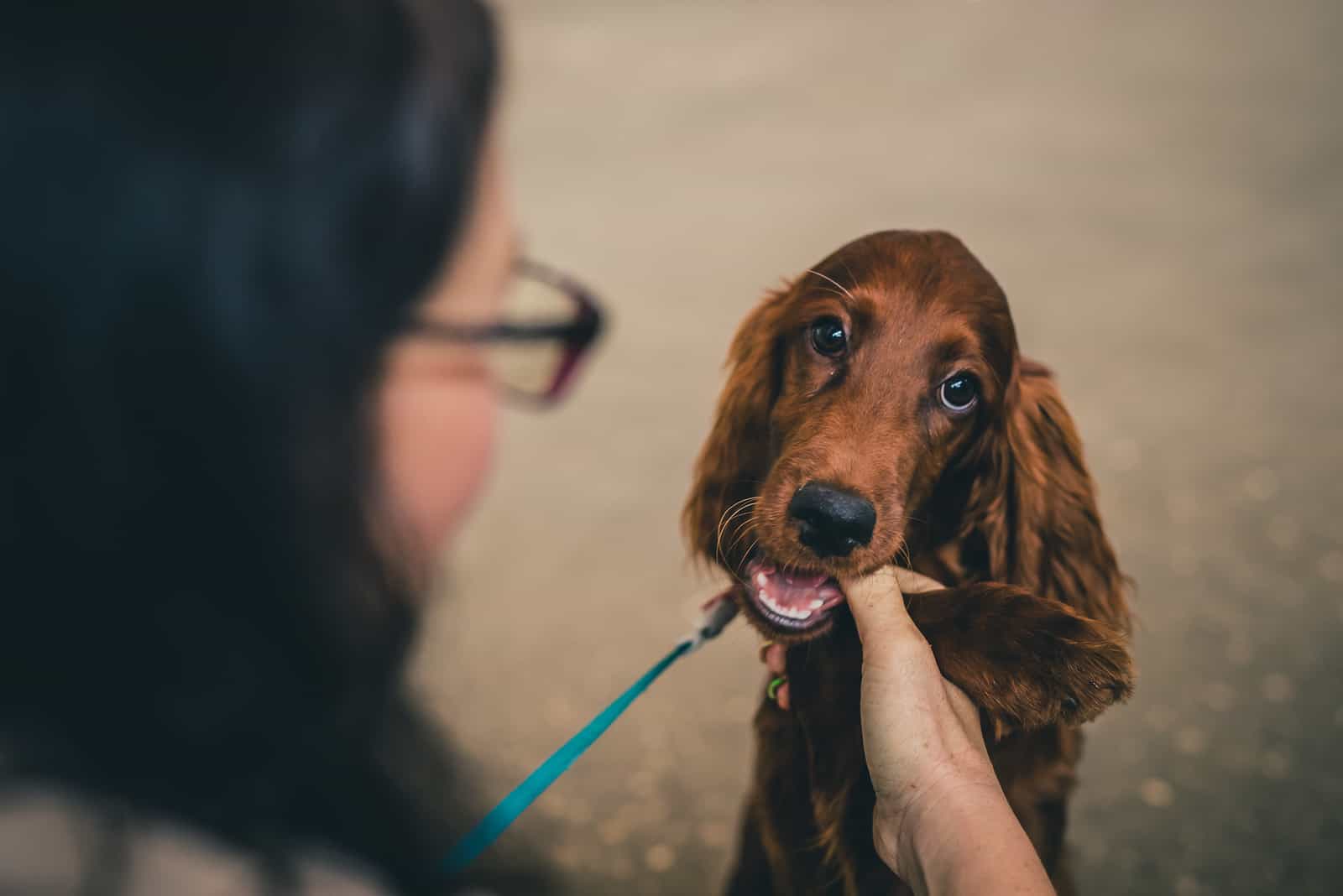
There are two possible answers here. Either your pup really loves you and is playing, or it has a real problem with you!
However, it’s more likely to be the first one.
Many dogs form a special attachment to one person in the pack, especially the pack leader (that’s you, remember?). It could be that your pup has formed a special bond with you and is simply playing as it would have done with its siblings in the litter.
Young pups will often play with one or other of their parents, mouthing at their ears and paws, sometimes getting too rough. It’s all part of their development, helping them to test their bite strength. Bite inhibition is learned naturally when the pup is left with the mother dog until the learning process ends naturally at around 12 weeks of age.
Why does my dog nibble on me? Or, in this case, why does it bite you and not anyone else? Because you’re the leader of the pack!
Why Does My Dog Bite Me When I Come Home?
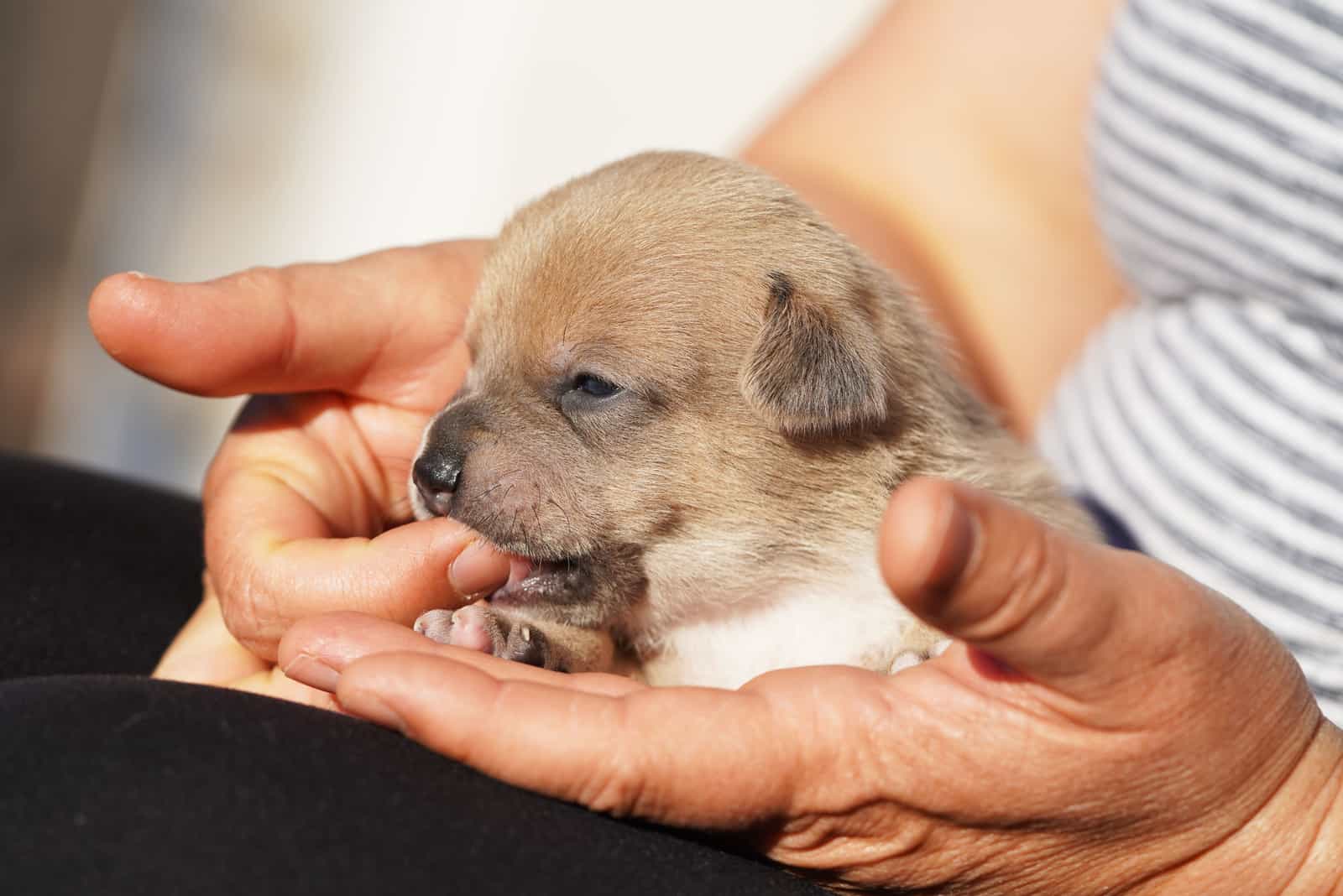
Is it really biting you or just having a playful nibble?
In a way, it doesn’t matter as it’s possibly doing either because of separation anxiety. Most dogs don’t cope well being left home alone for long periods of time. And to a dog, even an hour can seem like a lifetime.
Separation anxiety happens when a dog becomes frustrated, bored, lonely, or all three because you’re not there. It feels that it’s been abandoned and will effectively suffer from a panic attack that causes uncharacteristic and destructive behavior.
When you get home, your pooch will most probably explode in a flurry of fur and kisses, and it might well get carried away and bite you in the heat of the moment. Now, this might seem to you like a punishment for leaving them alone for so long, but this is unlikely.
Likewise with pooping or peeing inside the house or destroying your furniture. Your dog isn’t throwing a temper tantrum and trashing your home. It’s bored, lonely, and desperate for you to come home.
When you arrive home, your dog will go nuts and may even bite or nibble on you.
Dogs aren’t built to spend long periods of time alone. They are social, pack animals that have been bred with a strong desire for human companionship. If you must leave them at home by themselves during the day, you should at least reduce the impact using the following methods:
• Have other pets in the home so your dog isn’t alone.
• Use a dog sitting or dog walking service to break up the time.
• Ask friends or family to come over during the day to visit your pup.
• Leave plenty of interactive puzzle toys and dog chews for your dog to play with.
• Leave some music playing or a TV on so that there are normal sounds to fill the silence.
• Leave an old item of clothing with your dog, as your dog will take comfort in your scent.
• If you have a secure yard, fit a doggy door to allow them access to an outdoor space.
• Take them out for a long walk and lots of exercise so that they use up their energy before you leave them alone. They will then use some of that time to rest and recover.
You should also try to limit the fuss around leaving and arriving home. This trains your dog to understand that it’s normal for you not to be there at times.
Why Does My Dog Bite Me So Much?
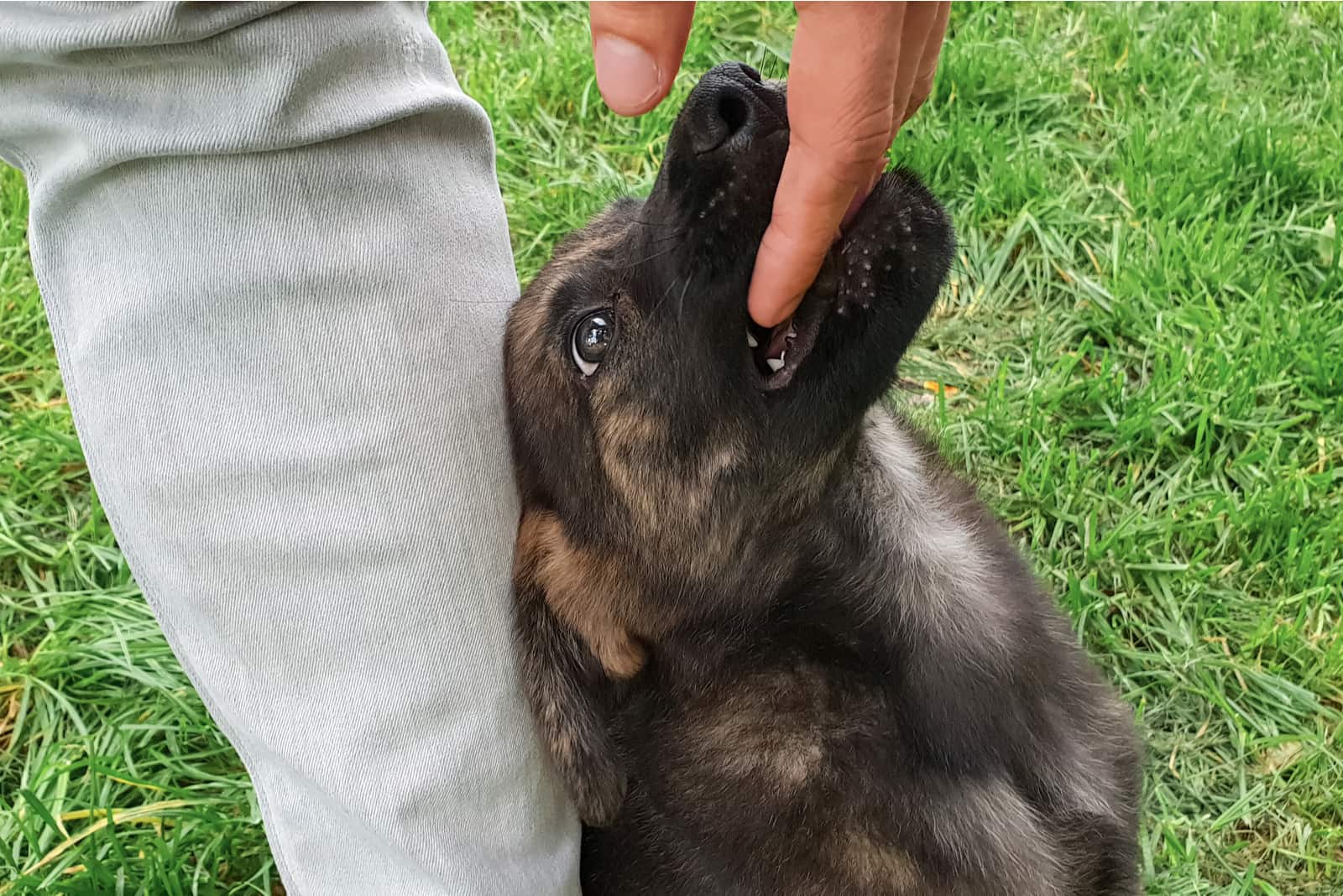
We dealt with puppies biting you, but this is more of a problem if adult dogs do so.
The key here is to establish what we mean by so much and to discover whether this is a sign of aggressive behavior.
All good breeders start socialization at a young age to ensure that their pups are used to other dogs, animals, and people. This helps to reduce the risk of aggression but won’t always rule it out completely. Some dog breeds are predisposed towards protective behavior that can turn to aggression. It’s up to you to continue the socialization process and to take your puppy to a dog trainer to minimize the chances of them becoming aggressive as an adult dog.
Even if your dog is playing with you, biting can be a real pain – literally! A pup that has not been taught bite inhibition will grow into a dog that doesn’t know when it’s hurting you. A biting habit can be a learned behavior, and if you don’t discourage it during puppyhood, you will regret it. In fact, you may have encouraged this behavior by reacting playfully, turning the whole thing into playtime. So, many pet parents have to take their share of the blame!
Real biting is not okay, especially in an adult dog. It’s a sign of poor training and socialization and might be a sign that the dog is naturally aggressive. It’s not impossible to train a dog to stop biting, but it is more difficult than training a young dog.
Aggressive dogs are another matter. Again, it’s not impossible to overcome, but you will need help from a professional dog trainer and possibly an animal behaviorist.
What Have We Discovered?
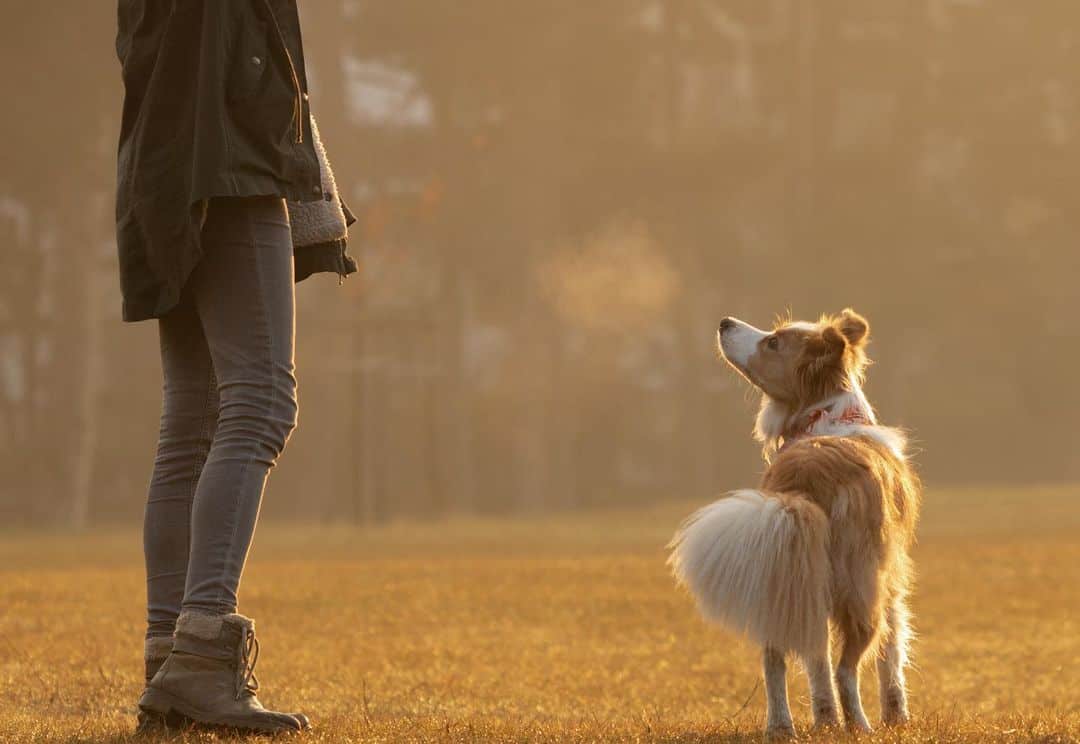
Photo from: @ellie_the.servicecollie
We started with the question, Why does my dog nibble on me?
Inevitably, we strayed into the subject of biting, as this is of more concern. But what did we learn? Let’s recap!
Dogs nibble on us because:
• They are grooming us.
• It’s a sign of affection.
• They like the taste and smell of our skin.
• They love the different textures of our clothes.
• They miss us when we’re not there and make up for it when we get home.
• They’re excited and want us to play.
• They just want our attention.
• They are puppies going through the teething process.
Biting behavior is potentially far more problematic as it can be a sign of sickness, injury, fear, anxiety, or aggression.
As pet parents, we need to observe our furry friends and take note of any odd behavior. Nibbling isn’t usually a sign of anything serious, but it’s good to try and understand what’s motivating your pooch. Pay attention to what else is happening. Do they have any symptoms of sickness or pain? Are they showing the classic signs of separation anxiety?
In the end, if it’s not excessive, and it doesn’t bother you, there’s nothing wrong with nibbling. Still, you should be in control, and your dog must stop when you say so.
In all probability, your pooch is simply saying, I love you. And that’s what every dog owner wants to hear.
Read Next: Dog Corn Cobbing – 7 Reasons For This Peculiar Dog Behavior
